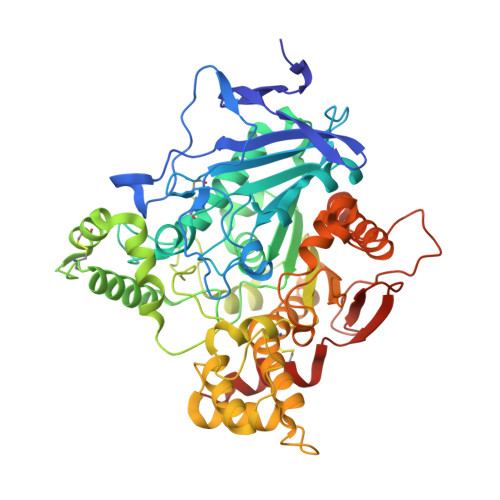Conformational Remodeling of Femtomolar Inhibitor-Acetylcholinesterase Complexes in the Crystalline State
Bourne, Y., Radic, Z., Taylor, P., Marchot, P.(2010) J Am Chem Soc 132: 18292
- PubMed: 21090615
- DOI: https://doi.org/10.1021/ja106820e
- Primary Citation of Related Structures:
2XUD, 2XUF, 2XUG, 2XUH, 2XUI, 2XUJ, 2XUK, 2XUO, 2XUP, 2XUQ - PubMed Abstract:
The active center of acetylcholinesterase (AChE), a target site for competitive inhibitors, resides centrosymmetric to the subunit at the base of a deep, narrow gorge lined by aromatic residues. At the gorge entry, a peripheral site encompasses overlapping binding loci for noncompetitive inhibitors, which alter substrate access to the gorge. The click-chemistry inhibitor TZ2PA6 links the active center ligand, tacrine, to the peripheral site ligand, propidium, through a biorthogonal reaction of an acetylene and an azide that forms either a syn1 or an anti1 triazole. Compared with wild-type mouse AChE, a Tyr337Ala mutant displays full catalytic activity, albeit with 2-3 orders of magnitude higher affinities for the TZ2PA6 syn1 and anti1 regioisomers, reflected in low femtomolar K(d) values, diffusion-limited association, and dissociation half-times greater than 1 month and 1 week, respectively. Three structures of each of the co-crystallized syn1 and anti1 complexes of the Tyr337Ala mutant were solved at three distinct times of crystal maturation, consistent with or exceeding the half-lives of the complexes in solution, while crystalline complexes obtained from soaked Tyr337Ala crystals led to picturing "freshly formed" complexes. The structures, at 2.55-2.75 Å resolution, reveal a range of unprecedented conformations of the bound regioisomers, not observed in the wild-type AChE complexes, associated with concerted positional rearrangements of side chains in the enzyme gorge. Moreover, time-dependent conformational remodeling of the crystalline complexes appears to correlate with the dissociation half-times of the solution complexes. Hence, for the tight-binding TZ2PA6 inhibitors, the initial complexes kinetically driven in solution slowly form more stable complexes governed by thermodynamic equilibrium and observable in mature crystals.
Organizational Affiliation:
Architecture et Fonction des Macromolécules Biologiques (AFMB, CNRS UMR-6098), Universités d'Aix-Marseille, Campus Luminy-Case 932, F-13288 Marseille cedex 09, France. yves.bourne@afmb.univ-mrs.fr

















